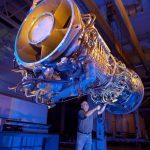
World’s Largest Containership Flying The French Flag Delivered To CMA CGM
January 26, 2018
DMA: e-Navigation Paves The Way For Safe And Efficient Shipping
January 29, 2018
Introduction of the “eco-friendly LPG (Liquid Petroleum Gas) fueled ship” is near with the ship development completed and is expected to see it next year in Korea, which reduces the emissions of SOx, NOx and PM and other toxic materials significantly. Korea LPG Association announced for the execution of an MOU for “LPG Ship Bunkering Hub and Infrastructure development” on the 25th of January at Korea Mariners Center in Busan. Participating companies are GE with gas turbine engine technology, Hyun-Seong MCT, which is leading LPG ship project, YoungSung Global as a ship operator, Far East Ship Design & Engineering as a ship design company, Dintec as a ship management company, Answer as a supplier of FGSS(Fuel Gas Supply System) and Tank, Bureau Veritas, French Classification, Yuil as a shipyard.
The member companies at the MoU ceremony expressed the vision of promoting LPG bunkering hub and infrastructure development including ship to ship fueling capability for eco-friendly LPG fueled ships, first targeting a coastal car ferry that is expected to operate next year. Once the project is completed, Korea will have established the world’s first LPG bunkering hub and can position well for the market to supply LPG as marine fuel.
LPG industry has cooperated with GE and other partners since 2016 for the development of LPG fueled ships. They now have completed the ship design as well as received an approval in principle and plan for the ship delivery and operation by next year. With this MOU, these partners will establish the system to supply LPG as marine fuel including “SHIP-TO-SHIP LPG bunkering” system.
The LPG fueled ship currently being developed will be operated as a passenger car ferry cruising between Korean domestic ports and for Korea-China or Korea-Japan routes. The ship’s route will be confirmed first and the shipbuilding contract will be signed during the 1st quarter this year and we will see the first LPG fueled ship in Korea next year.
The LPG fueled ship is eco-friendly as its emission of NOx, Sox, and PM being 80% lower than conventional ship burning HFO. Additionally, gas turbine engine’s weight and volume are much smaller than conventional diesel engines, which allows for flexible design, improved energy efficiency, all translated to the reduction of operating costs.
Starting from 2020, International Maritime Organization (IMO) strengthened its emission regulation requirements. It is expected that gas fuels such as LPG and LNG (Liquified Natural Gas) will be more used as marine fuels for next-generation, eco-friendly ships. Astomos, the largest LPG supplier in Japan also joined this trend for more LPG fueled ships, already developing LPG fueled VLGC (Very Large Gas Carrier) by 2020.
The Ministry of Oceans and Fisheries has conducted a study for “LPG fueled ship’s feasibility and safety” since November last year. This study will serve as a baseline for setting up rules and regulations for gas fueled ship based on its feasibility and safety.
Press Release
Source: Maritime Shipping News




